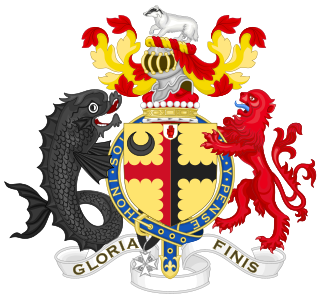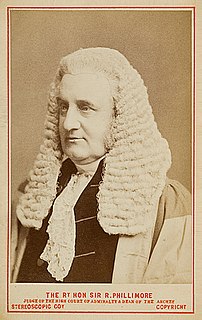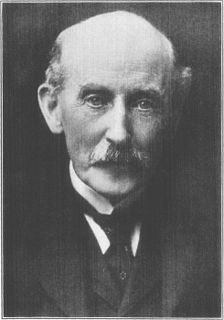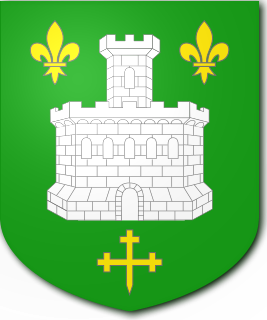
Earl Ferrers is a title in the Peerage of Great Britain. It was created in 1711 for Robert Shirley, 14th Baron Ferrers of Chartley. The Shirley family descends from George Shirley of Astwell Castle, Northamptonshire. In 1611 he was created a Baronet, of Staunton Harold in the County of Leicester, in the Baronetage of England. He was succeeded by his son Henry, the second Baronet, who married Lady Dorothy Devereux, daughter of Robert Devereux, 2nd Earl of Essex. On the death of her brother Robert Devereux, 3rd Earl of Essex, she became the youngest co-heir to the baronies of Ferrers of Chartley and the barony of Bourchier, which had fallen into abeyance on the death of the third Earl. Shirley was succeeded by his eldest son, the third Baronet. He died unmarried and was succeeded by his younger brother, the fourth Baronet. He was imprisoned in the Tower of London by Cromwell and died there in 1656. On his death the title passed to his eldest son, the fifth Baronet. He died at an early age and was succeeded at birth by his posthumous son, the sixth Baronet.

Earl of Onslow, of Onslow in the County of Shropshire and of Clandon Park in the County of Surrey is a title in the Peerage of the United Kingdom. It was created in 1801 for George Onslow, 4th Baron Onslow.

Earl of Lonsdale is a title that has been created twice in British history, firstly in the Peerage of Great Britain in 1784, and then in the Peerage of the United Kingdom in 1807, both times for members of the Lowther family.

Earl of Stradbroke, in the County of Suffolk, is a title in the Peerage of the United Kingdom. It was created in 1821 for John Rous, 1st Baron Rous, who had earlier represented Suffolk in the House of Commons.

Viscount Brookeborough, of Colebrooke in the County of Fermanagh, is a title in the Peerage of the United Kingdom. It was created in 1952 for the Ulster Unionist politician and Prime Minister of Northern Ireland, Captain The Rt. Hon. Sir Basil Brooke, 5th Bt., P.C. (N.I.), M.P.

Baron Faringdon, of Buscot Park in the County of Oxfordshire, is a title in the Peerage of the United Kingdom. It was created in 1916 for Sir Alexander Henderson, 1st Baronet, who had previously represented Stafford West and St George's, Hanover Square in the House of Commons as a Liberal Unionist. He had already been created a baronet in 1902. He was succeeded by his grandson, the second Baron. He was the son of the Hon. Harold Henderson, eldest son of the first Baron, who predeceased his father. Lord Faringdon was a member of the London County Council. As of 2017 the titles are held by his nephew, the third Baron, who succeeded in 1977. He is the son of the Hon. Michael Thomas Handerson, second son of the Hon. Harold Henderson.

Baron Glenconner, of The Glen in the County of Peebles, is a title in the Peerage of the United Kingdom. It was created in 1911 for Sir Edward Tennant, 2nd Baronet, who had earlier represented Salisbury in the House of Commons as a Liberal and also served as Lord Lieutenant of Peeblesshire. Lord Glenconner was succeeded by his second son, the second baron. The latter was succeeded in 1983 by his eldest son, the third baron, who bought the island of Mustique. As of 2014, the titles are held by the third baron's grandson, the fourth baron, who became the next-to-youngest peer in the realm when he succeeded in August 2010.

Baron Denman, of Dovedale in the County of Derby, is a title in the Peerage of the United Kingdom. It was created in 1834 for the prominent lawyer, judge and Whig politician Thomas Denman. He served as Lord Chief Justice of the King's Bench from 1832 to 1850. His son, the second Baron, assumed in 1876 by royal licence the additional surname of Aitchison, which was that of his father-in-law. He was succeeded by his grandnephew, the third Baron. He was the grandson of the Hon. Richard Denman, younger son of the first Baron. Lord Denman notably served as Governor-General of Australia from 1911 to 1914. He was succeeded by his eldest son, the fourth Baron. On his death in 1971, the title passed to his first cousin, Sir Charles Denman, 2nd Baronet, of Staffield, who became the fifth holder of the title.

Baron Avebury, of Avebury in the County of Wiltshire, is a title in the Peerage of the United Kingdom. It was created 22 January 1900 for the banker, politician and archaeologist Sir John Lubbock, 4th Baronet. He was succeeded by his eldest son, the second Baron. On his death the titles passed to his nephew, the third Baron. He was the son of Harold Fox Pitt Lubbock, fourth son of the first Baron, who died in 1971. The title then passed to the third Baron's first cousin, the fourth Baron, the son of Maurice Fox Pitt Lubbock, sixth son of the first Baron. The fourth baron was a Liberal Democrat politician and one of the ninety excepted hereditary peers who remained in the House of Lords after the passing of the House of Lords Act 1999. He was succeeded by his son, the fifth Baron, in 2016.

Baron Poltimore, of Poltimore in the County of Devon, is a title in the Peerage of the United Kingdom. It was created in 1831 for Sir George Bampfylde, 6th Baronet. His son, the second Baron, held office as Treasurer of the Household from 1872 to 1874 in the first Liberal administration of William Ewart Gladstone.

Baron Phillimore, of Shiplake in the County of Oxford, is a title in the Peerage of the United Kingdom. It was created in 1918 for the former Judge of the High Court of Justice and Lord Justice of Appeal, Sir Walter Phillimore, 2nd Baronet. The Phillimore Baronetcy, of The Coppice, had been created in the Baronetage of the United Kingdom on 28 December 1881 for his father Sir Robert Phillimore, who was also a noted lawyer and judge. The first Baron was succeeded by his son, the second Baron.
Baron Moncreiff, of Tulliebole in the County of Kinross, is a title in the Peerage of the United Kingdom. It was created on 9 January 1874 for the lawyer and Liberal politician Sir James Moncreiff, 1st Baronet. He had already been created a Baronet, of Kilduff in the County of Kinross, in the Baronetage of the United Kingdom on 23 May 1871. In 1883 Lord Moncreiff also succeeded his elder brother as 11th Baronet, of Moncreiff in the County of Perth. On his death the titles passed to his eldest son, the second Baron. He was a Judge of the Court of Session from 1888 to 1905 under the title of Lord Wellwood and served as Lord Lieutenant of Kinross-shire between 1901 and 1909. He was succeeded by his younger brother, the third Baron. He was a clergyman. As of 2010 the titles are held by the latter's great-grandson, the sixth Baron, who succeeded his father in 2002.

Baron Tennyson, of Aldworth in the County of Sussex and of Freshwater in the Isle of Wight, is a title in the Peerage of the United Kingdom. It was created in 1884 for the poet Alfred Tennyson. His son, the second Baron, served as Governor-General of Australia, and his grandson, the third Baron, as a captain for the English cricket team. On the death in 2006 of the latter's younger son, the fifth Baron, the line of the eldest son of the first Baron failed. The title was inherited by the late Baron's second cousin once removed, the sixth and present holder of the peerage. He is the great-grandson of Hon. Lionel Tennyson, second son of the first Baron.

Baron Carnock, of Carnock in the County of Stirling, is a title in the Peerage of the United Kingdom. It was created in 1916 for the former Permanent Under-Secretary in the Foreign Office, Sir Arthur Nicolson, 11th Baronet.
Baron Cawley, of Prestwich in the County Palatine of Lancaster, is a title in the Peerage of the United Kingdom. It was created in 1918 for the Liberal politician Sir Frederick Cawley, 1st Baronet. He had previously represented Prestwich in the House of Commons and served as Chancellor of the Duchy of Lancaster from 1916 to 1918. Before his elevation to the peerage, Cawley had been created a baronet, of Prestwich in the County Palatine of Lancaster, in the Baronetage of the United Kingdom, in 1906. His grandson, the third Baron, notably served as Deputy Chairman of Committees in the House of Lords from 1958 to 1967. As of 2011 the titles are held by the latter's eldest son, the fourth Baron, who succeeded in 2001.

The Havelock-Allan Baronetcy, of Lucknow, is a title in the Baronetage of the United Kingdom. It was created on 22 January 1858. Originally intended for the celebrated soldier Sir Henry Havelock, it was granted after his death to his eldest son and namesake Lieutenant-General Henry Havelock, with special remainder, in default of male issue of his own, to the male issue of his father. In 1880, having inherited the Durham estate of the Allans at Blackwell Grange, he assumed by Royal licence the additional surname of Allan. He was succeeded by his eldest son, the second Baronet. He represented Bishop Auckland in the House of Commons. The fourth Baronet was a film producer and the first husband of the actress Valerie Hobson. As of 2007 the title is held by their eldest son, the fifth Baronet, who succeeded in 2003.
There have been two baronetcies created for persons with the surname Howard, both in the Baronetage of the United Kingdom. One creation is extinct while the other is extant.
Sir Felix Maximilian Schoenbrunn Cassel, 1st Baronet, PC, QC, JP was a German-born British barrister and politician who served as Judge Advocate-General, the senior civilian lawyer of the War Office responsible for the administration of courts-martial, from 1915 to 1934.
There have been four baronetcies created for persons with the surname Barlow, one in the Baronetage of England and three in the Baronetage of the United Kingdom.

The Abdy baronetcy, of Felix Hall, in the County of Essex, was created in the Baronetage of England on 14 July 1641 for Thomas Abdy who was High Sheriff of Essex. The title became extinct in 1868.












